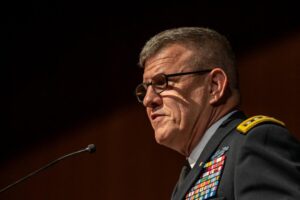The Army will not hold a capstone demonstration for its ongoing Project Convergence (PC) experimentation campaign this year, with the next event slated for spring 2024 at the earliest.
Gen. James Rainey, head of Army Futures Command (AFC), confirmed the update on Monday at an event where he also detailed AFC’s shift in focus to designing “the Army of 2040.”

“I have shifted the main effort of AFC to 2040. We got to get out further,” Rainey told attendees at an Association of the United States Army discussion in Arlington, Va. “I’m talking about transformation. We need to outthink the Chinese, boldly maneuver ahead of them, grab some ground and anchor it so they wake up trying to figure out how they’re going to keep with us.”
The Austin, Texas-based AFC has focused on driving Army modernization efforts, to include developing requirements for the service’s portfolio of more than 30 new “signature systems” that will begin fielding soon and into the next decade.
Rainey said AFC’s goal for delivering the “Army of 2030” is in “a good place,” as his command eyes its next set of priorities.
“Not a long is going to change between now and ‘30,” Rainey said. “The big opportunities are to figure out what the next big evolution of warfare is and deliver formation-based solutions to that.”
Rainey noted Futures Command is working on a new operating concept to inform how the Army will look to design itself for 2040.
“That’s probably the most important thing that AFC is doing. More to follow on that,” Rainey said.
Army Secretary Christine Wormuth said in October she sees “plenty of work ahead” for Futures Command beyond the its work helping develop the current portfolio of modernization systems, adding that AFC will have a “really important role” in helping to define the next operating concepts and technologies for 2040 and beyond (Defense Daily, Oct. 10).
The update on Project Convergence, first reported by Defense News, aligns with Rainey’s emphasis that the campaign should include both persistent experimentation throughout the year along with using a larger-scale, capstone event to inform priorities.
“One thing about Project Convergence, everybody thinks it’s like one big thing every 12 to 18 months. Project Convergence is a persistent experimentation effort, right,” Rainey said. “I’ve got another 30 days before I owe the chief and secretary an answer on when I think we should do the next [Project Convergence capstone experiment] and the scope and scale of it.”
The Project Convergence capstone events to date have been held in the late fall, with each year drawing greater participation from joint and international partners to work on experimenting with technology and collaborating on efforts such as data transfer and sensor-to-shooter capabilities.